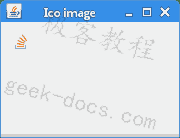在本文中,我们展示了如何在 Java 中读取和写入 ICO 图像。
ICO 是在 Microsoft Windows 上的图标中使用的图像文件格式。 ICO 文件包含一个或多个具有多种尺寸和颜色深度的小图像,因此可以适当缩放它们。 ICO 文件也经常用于网络上的收藏夹图标。
要使用 Java 读写 ICO 文件,我们使用 image4j 图片库。 可以从 image4j.sourceforge.net 下载用于 image4j 的 JAR。
将 PNG 转换为 ICO
在以下示例中,我们将 PNG 图像转换为 ICO 图像。
ConvertToIcoEx.java
package com.zetcode;
import java.awt.image.BufferedImage;
import java.io.File;
import java.io.IOException;
import javax.imageio.ImageIO;
import net.sf.image4j.codec.ico.ICOEncoder;
public class ConvertToIcoEx {
public static void main(String[] args) throws IOException {
BufferedImage bi = ImageIO.read(new File("laptop.png"));
ICOEncoder.write(bi, new File("laptop.ico"));
}
}
我们使用ImageIO.read()方法将 PNG 文件读入BufferedImage。 BufferedImage是存储在内存中的像素矩形。 它是 Swing 中最重要的图像类型之一。
ICOEncoder.write(bi, new File("laptop.ico"));
ICOEncoder.write()将 PNG 转换为 ICO 文件。
将 ICO 转换为 PNG
在第二个示例中,我们将 ICO 图像转换为 PNG 图像。
ConvertIcoToPngEx.java
package com.zetcode;
import java.awt.image.BufferedImage;
import java.io.File;
import java.io.IOException;
import java.util.List;
import javax.imageio.ImageIO;
import net.sf.image4j.codec.ico.ICODecoder;
public class ConvertIcoToPngEx {
public static void main(String[] args) throws IOException {
List<BufferedImage> images = ICODecoder.read(new File("favicon.ico"));
ImageIO.write(images.get(0), "png", new File("favicon.png"));
}
}
我们使用ICODecoder.read()方法将 ICO 文件读入BufferedImage。 通过ImageIO.write()方法将BufferedImage写入 PNG 文件。
下载 ICO 文件
在下一个示例中,我们从网站下载 ICO 文件,将其转换为ImageIcon,并在JLabel组件中显示。
DownloadIcoEx.java
package com.zetcode;
import java.awt.Container;
import java.awt.EventQueue;
import java.awt.image.BufferedImage;
import java.io.IOException;
import java.io.InputStream;
import java.net.MalformedURLException;
import java.net.URL;
import java.util.List;
import java.util.logging.Level;
import java.util.logging.Logger;
import javax.swing.GroupLayout;
import javax.swing.ImageIcon;
import javax.swing.JComponent;
import javax.swing.JFrame;
import static javax.swing.JFrame.EXIT_ON_CLOSE;
import javax.swing.JLabel;
import net.sf.image4j.codec.ico.ICODecoder;
/**
* The example downloads a favicon and displays it in a JLabel.
*
* @author Jan Bodnar
* @website zetcode.com
*/
public class DownloadIcoEx extends JFrame {
public DownloadIcoEx() {
initUI();
}
private void initUI() {
List<BufferedImage> images = readImage();
ImageIcon icon = new ImageIcon(images.get(0));
JLabel lbl = new JLabel(icon);
createLayout(lbl);
setTitle("Ico image");
setLocationRelativeTo(null);
setDefaultCloseOperation(EXIT_ON_CLOSE);
}
private List<BufferedImage> readImage() {
List<BufferedImage> images = null;
try {
String path = "http://stackoverflow.com/favicon.ico";
InputStream istr = new URL(path).openStream();
images = ICODecoder.read(istr);
} catch (MalformedURLException ex) {
Logger.getLogger(DownloadIcoEx.class.getName()).log(Level.SEVERE, null, ex);
} catch (IOException ex) {
Logger.getLogger(DownloadIcoEx.class.getName()).log(Level.SEVERE, null, ex);
}
return images;
}
private void createLayout(JComponent... arg) {
Container pane = getContentPane();
GroupLayout gl = new GroupLayout(pane);
pane.setLayout(gl);
gl.setAutoCreateContainerGaps(true);
gl.setHorizontalGroup(gl.createSequentialGroup()
.addComponent(arg[0])
.addGap(150)
);
gl.setVerticalGroup(gl.createParallelGroup()
.addComponent(arg[0])
.addGap(100)
);
pack();
}
public static void main(String[] args) {
EventQueue.invokeLater(() -> {
DownloadIcoEx ex = new DownloadIcoEx();
ex.setVisible(true);
});
}
}
该示例从 StackOverflow 网站下载了一个图标。
String path = "http://stackoverflow.com/favicon.ico";
InputStream istr = new URL(path).openStream();
我们从 URL 创建一个InputStream。
images = ICODecoder.read(istr);
ICODecoder.read()从InputStream读取到BufferedImage
ImageIcon icon = new ImageIcon(images.get(0));
从BufferedImage创建一个ImageIcon。
JLabel lbl = new JLabel(icon);
将ImageIcon放入JLabel。

Figure: Favicon
在本文中,我们已使用 image4j 库读取和写入 ICO 图像。
 极客教程
极客教程